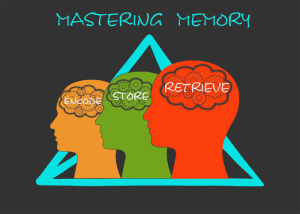32
As you identify the content you are working to learn, you will often discover things that you will need to commit to memory. What strategies will help you to remember important information effectively so that you can recall it on tests, apply it to subsequent courses, and use it throughout your life and career?

What is memory?
Memory can be understood at two different levels. On a Conscious Level, memory is what you are aware of as a result of a your attempt to recall information. It may appear as distinct and unconnected mental events. While this may satisfy your awareness of memory, it doesn’t really explain exactly what memory is. For that, you need to look at memory from a physiological perspective.
On a Biological Level, memory is not a “place” or “thing,” it’s a PROCESS of brain pattern activity involving the chemical processes of the brain, firing of neurons, and connecting of synapses. The result of a series of cells connecting several times in a similar pattern is memory. A good definition of memory might be that memory is the probability that certain patterns of brain activity will occur again in the future.[1] It is the ability to remember past information and experiences and is your record of the learning process. The human brain has the ability, known as neuroplasticity, that allows it to form new neural pathways, alter existing connections, and adapt and react in ever-changing ways as you learn. Information must go into your long term memory and then, to retrieve it from your memory, you must have a way of getting it back. Click here to view a short video that provides a visual understanding of this process.
Learning and Long Term Memory
Memory is often distinguished by the ease in which your brain can recreate the patterns that represent your knowledge. Sometimes your brain can easily recreate the pattern and recall information and sometimes it’s not very easy. At any given moment you may be able to remember some things and not others. These differences define what are often considered the two types of memory, long term and short term.
Long Term Memory refers to the brain pattern activity that is not difficult to recreate even after long periods of time. Conversely, Short Term Memory refers to the brain pattern activity that is difficult to recreate after a short period of time. Unless there is an injury or illness that causes neurological damage to your brain, you probably never have much trouble in remembering your name, phone number, and address. These items are safely sealed in to your long term memory brain processes. Occasionally though, information that we want in long term memory slip into short term memory and become difficult to recall.
Long-term memory reflects all the significant events that mark your life; it lets you retain the meanings of words and the physical skills that you have learned. While there is no magic formula to guarantee that information will always find its way to long term memory these three steps are involved in establishing a more likely gateway to long term memory:
- encoding – To encode, you assign meaning to the information.
- storage – To store information, you review it and its meanings (study), as repetition is essential to remembering.
- retrieval – To retrieve it, you follow the path you created through encoding. This may include a number of memory triggers that you used when you were encoding.
References: [2]
Licenses and Attributions:
Content previously published in University 101: Study, Strategize and Succeed by Kwantlen Polytechnic University, licensed as CC BY-SA.
Adaptations: Added and relocated content
